Keynotes
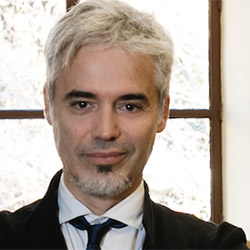
Miguel Bastos Araújo
Professor Spanish Research Council (CSIC) National Museum of Natural Sciences, Madrid
Professor Chair of Biodiversity at the University of Évora
Miguel Bastos Araújo is a biogeographer seeking to understand how different facets of Life distribute in space and time, and why. He uses a plethora of data-driven and modelling approaches to improve understanding of how climate determines the distributions of species and properties of self-organised community dynamics. Past, current, and future climate changes offer the context for much of his work as they provide spatiotemporal laboratories for understanding change. He is currently a Research Professor at National Museum of Natural Sciences of the Spanish Research Council (CSIC) and Professor at the University of Évora, while serving as Editor-in-Chief of Ecography. Previously, he held positions at the Imperial College London, University of Copenhagen, Oxford University, the CNRS, and the Natural History Museum in London. He his recipient of several prestigious awards, including the European Ecological Federation Ernst Haeckel Prize (2019), the Pessoa Prize (2018), the Rey Jaime I Prize (2016), International Biogeography Society MacArthur & Wilson Award (2013), and the Global Biodiversity Information Facility Ebbe Nielsen Prize (2013).
Keynote:
Moving away from individual species models of biodiversity response to climate change
In the past two decades, there has been a significant increase in studies using models to understand and predict the impact of environmental changes on biodiversity. Typically, these studies begin by examining the relationship between species distributions and environmental variables, based on the assumption that the environment determines the limits of tolerance for species survival. As a result, alterations in environmental conditions are expected to lead to shifts in species distributions. However, a major shortcoming of existing models is their focus on individual species. Although these models can be applied to thousands of species at once, they often treat each species as an independent entity, reacting in isolation to environmental changes. This approach neglects the complex dynamics within ecological communities, where collective species responses to environmental changes are not merely the sum of individual responses.
While incremental improvements to existing models are possible, progress necessitates the development of models that capture the responses of entire communities to environmental change. I suggest a promising direction would be to shift from the traditional environmental-limiting niche theory, which is applicable to individual species, to a resource-limiting niche theory. This approach considers the impact of the environment on the coexistence of multiple species within communities, providing a more comprehensive understanding of ecological dynamics.
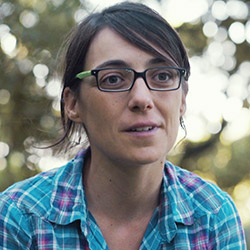
Aida Cuni-Sanchez
Norwegian University of Life Sciences, honorary fellow University of York
Dr Aida Cuni-Sanchez is an Associate Professor at the Norwegian University of Life Sciences, and an honorary fellow at the University of York. She has a PhD in environmental Sciences from the University of Southampton (UK) and a Licenciatura in Biology from the University of Barcelona (Spain). She has over 10 years of work experience in 12 countries in tropical Africa, where she has focused on tropical forest ecology and carbon stocks, forest use and valuation by local communities and local communities’ adaptation to climate change. She received the 2020 L’Oreal-UNESCO Women in Science UK Award for Sustainable Development and the Chr. Michelsen price for outstanding development research (Norway) in March 2022. As well as developing the AfriMont plot network, she is a key partner in research collaborations in Africa including AfriTRON (tropical lowland forest monitoring), Mountain Research Initiative, Mountain Sentinels and ATBC-Africa Chapter.
Keynote:
Local perceptions of forest ecosystem services, insights from Africa
Human culture has an important influence on how forests are utilised, yet its influence on ecosystem service (ES) use and valuation remains underexplored. During the past 5 years, we have investigated how livelihood strategy (farmers, pastoralists, hunter-gatherers) and ethnicity affect local peoples’ perceptions of forest ES in tropical Africa, relating their views to instrumental, relational and intrinsic values of Nature. I will present our findings from different socio-ecological contexts in West, Central and East Africa, and also introduce unpublished data on a recent survey carried out with ‘forest experts’ (scientists and practitioners working in some of these forests).
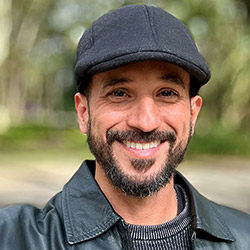
Marco Mello
University of São Paulo, Associate Professor
Imagine a world where ecological systems were a jigsaw puzzle, and the pieces were scattered across the vastness of data and ideas. This is where Marco comes in. As a biologist with a Ph.D. in ecology and an alumnus of the Alexander von Humboldt-Stiftung, Germany, he works as a professor at the University of São Paulo, Brazil, where he specializes in ecological synthesis. His mission is to unveil the hidden assembly rules of ecological systems formed by species interactions. Bats have always been his main study model, although he also conducts research on many other organisms. His work is like that of a detective, piecing together scattered fragments of information, connecting the dots between data and ideas to reveal the big picture. But his work doesn’t stop there. As an educator, he is dedicated to training young scientists and making scientific knowledge accessible to all.
Keynote:
The elephant, the monks, and the topology of interaction networks
Sometimes, in science, we get so obsessed with a particular piece of a puzzle, that we miss the big picture. The same seems to be happening in the study of interaction networks, with different schools arguing over pieces of reality. Aiming to take a step back and change our perspective, this presentation describes a novel cognitive model that provides an integrative solution to two classical dilemmas about interactions between organisms of different species. Our research team, in collaboration with other experts, embarked on an extensive investigation to uncover the underlying principles that could lead to this solution. Through a comprehensive analysis, first, we demonstrated the commonalities between the dilemmas, and employed a graphical model to better understand the theoretical connection between them. We then developed an algorithmic model that predicts the four most commonly observed network topologies in nature. Our cognitive model, initially designed for antagonisms in monolayer networks, was subjected to a series of empirical tests and logical deductions. The results show that the model can be extended to mutualisms and multilayer networks, highlighting its broad applicability. Currently, we are working to refine the model and develop it into a new semantic theory, which may have significant implications for basic and applied ecology. We invite the audience to join us as we share the journey of discovery, unveiling the exciting possibilities that this new theory presents.
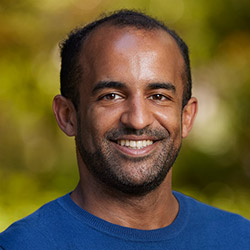
Ricardo Rocha
University of Oxford, UK
Ricardo Rocha is an Associate Professor in Conservation Science at University of Oxford. His research aims to provide evidence-based knowledge to support conservation decision-making under contemporary global change, with a special focus on how to restore biodiversity in the aftermath of habitat loss and fragmentation and how to manage human-modified landscapes to retain biodiversity and maximize ecosystem services. He does this by: i) investigating taxonomic, functional, and phylogenetic responses to habitat loss, fragmentation, and secondary forest regeneration from both spatial and temporal perspectives, ii) identifying management options that can augment the permeability of agricultural land to disturbance-sensitive species and investigating agriculture-related ecosystem services and disservices, and iii) assessing the efficiency of conservation interventions and providing tools to facilitate and inform evidence-based decision-making. His work is grounded in ecological theory and involves biodiversity surveys across large-scale manipulative experiments, "real-world" working landscapes, and island ecosystems.
Keynote:
The role of secondary forests in mitigating fragmentation-related extinctions: Insights from an Amazonian whole-ecosystem manipulation experiment
Secondary forests are the predominant type of forest cover across the tropics. They provide myriad services and natural products to human populations worldwide and key habitat for countless forest-dwelling species. Although some fragmentation-related extinctions can be averted by forest regeneration, the role of second growth in biodiversity conservation remains controversial. Central to the debate is the capacity of secondary forests to preserve old-growth specialist species and to buffer the impacts of fragmentation on assemblages living in forest remnants. The Biological Dynamics of Forest Fragments Project (BDFFP) is one of the world's largest and longest-running experimental investigations. Spanning an area of ∼1000 km2 in the Central Brazilian Amazon, the BDFFP was initially designed to assess how fragment size influences biodiversity and ecological processes within rainforests. However, it has transcended its initial objectives, offering a wealth of insights into the long-term ecological dynamics of fragmented landscapes and their intricate relationship with forest regeneration. This talk will provide an overview of the research conducted over the last decades at the Biological Dynamics of Forest Fragments Project (BDFFP), examining with particular detail the taxonomic, functional, and phylogenetic responses of bats, one of the richest Amazonian mammalian groups, to forest regeneration. I will explore area, edge, and matrix effects and investigate time-related complexities related to both short- and long-term responses to changes in matrix structure and composition. Finally, taking the BDFFP as an illustrative example, we will discuss the conservation implications of these findings for tropical biodiversity and propose avenues for future research in temporal ecology.
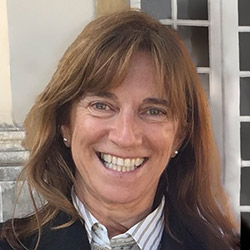
Anna Traveset
Mediterranean Institute of Advanced Studies (IMEDEA), Mallorca, Balearic Islands, Spain
[
Website]
Anna Traveset is a Research Professor at the Mediterranean Institute of Advanced Studies (IMEDEA), a mixed institution of the Spanish Research Council (CSIC) and the University of the Balearic Islands (UIB). She leads the Terrestrial Ecology Laboratory at IMEDEA where, along with her team, she investigates the impact of global change on native communities, specifically on the ecological interactions established between species. For this, she uses the approach of network theory, collaborating also with theoreticians from other institutions. She mostly works on island systems, currently coordinating an ERC project that embraces different archipelagos worldwide. She was awarded the Jaume I Prize (modality: Environmental Protection) and the Ramon Llull Prize from the Balearic Government in 2022. Since 2019 she is the CSIC delegate at the Balearic Islands, and is currently the Principal Investigator of the accreditation Project “Unidad de Excelencia María de Maeztu” at IMEDEA (2023-2027).
Keynote:
DECIPHERING THE COMPLEXITY OF ECOLOGICAL INTERACTIONS IN TROPICAL ISLANDS. A MULTILAYER NETWORK APPROACH
Globally, biodiversity is rapidly decreasing, with islands, constituting about 30% of biodiversity hotspots, facing heightened vulnerability. Anthropogenic activities have led to an alarming 80% of reported extinctions occurring among island species. Despite this, island biodiversity, encompassing diverse species and their interactions, remains inadequately explored. Urgent efforts are needed to document and predict the repercussions of its decline for effective mitigation. The challenge lies in detecting and understanding ecological interactions, a task addressed by emerging theories and tools like complex network analysis. Islands, as relatively simple systems with clear boundaries, offer significant potential to enhance our understanding of nature's complexity. In this talk, I will present you data on the ecological interactions we are studying, with a large variety of methodologies, in two tropical archipelagos, the Galapagos (Pacific Ocean) and the Seychelles (Indian Ocean). We are focusing on different layers of complexity, each corresponding to a different ecological function. We are using a multilayer network approach to unveil which are the keystone species in each community, which are the main functions, and to evaluate how vulnerable the community is to disturbance, specifically to biological invasions.
The biodiversity of these ecosystems is indeed unique but shows to be highly vulnerable to the introduction of invasive species. I will show you some preliminary data on the coextinction models we are using to predict persistence and resilience of island biota to disturbances.




